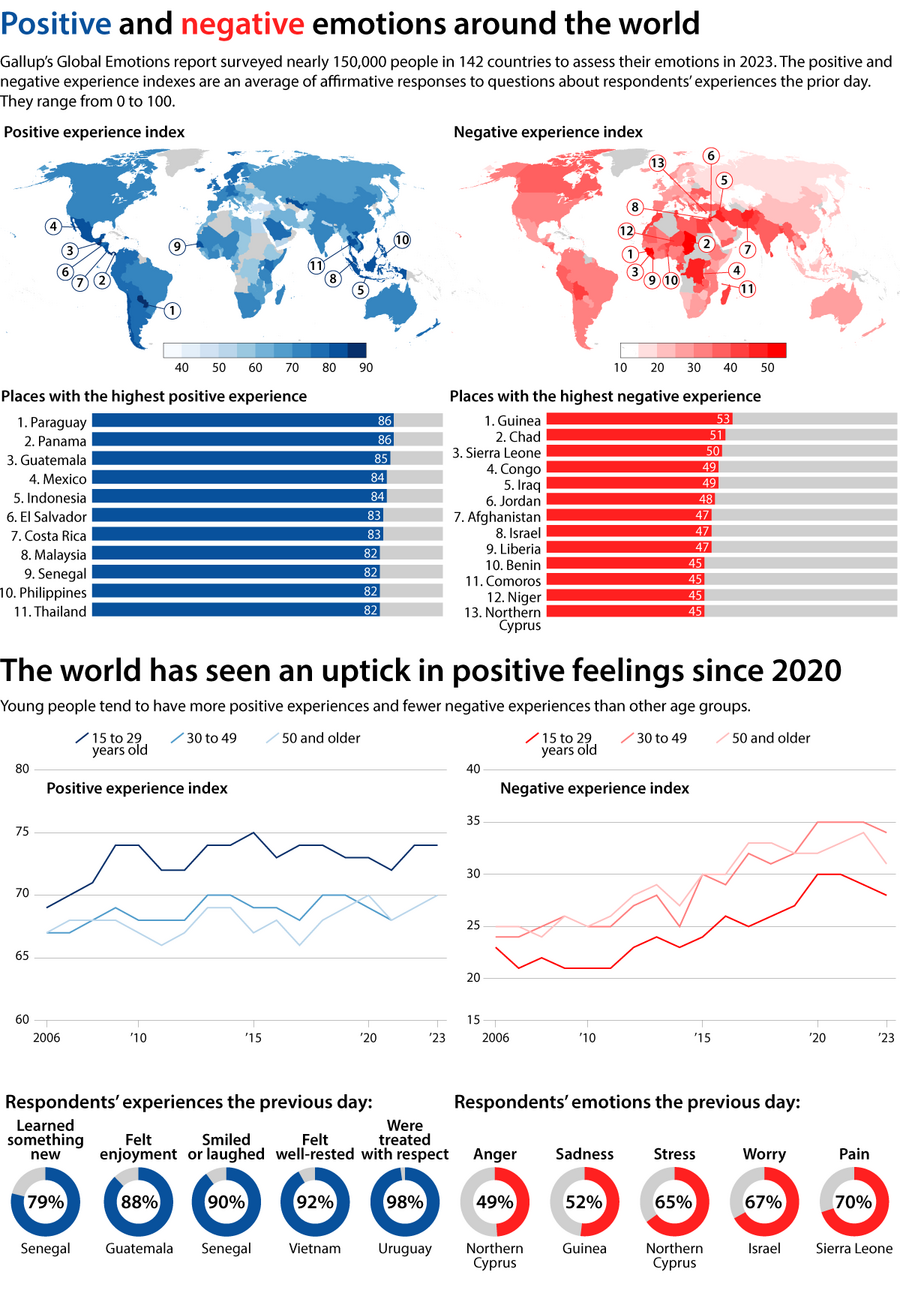Positivity increases worldwide, with young people leading the way
Loading...
Ask nearly anyone how the world is doing, and they are likely to tell you things aren’t going so well. And they would have plenty of evidence to point to, from war and political uncertainty to social divisions and pollution.
Yet ask someone near you how they personally are doing, and the response will probably be something closer to “Not so bad, actually.”
Why We Wrote This
Despite what feels like a constant flow of bad news these days, a majority around the world say they feel well rested and joyful. And young people are the most positive of all.
At least that’s what the latest Gallup Global Emotions report finds. Positive emotions have rebounded since the start of the pandemic, and negative emotions, including worry, sadness, and stress, have dropped for the first time since 2014.
Over 70% of those surveyed around the globe in 2023 reported feeling well rested, experiencing a lot of enjoyment, and smiling or laughing a lot. Nearly 9 in 10 people said they feel they’re treated with respect. And young people – a source of continual concern for older generations – are the most positive of all.
The yearly study, which has measured the emotional well-being of around 1,000 participants in each of 142 participating countries since 2006, is meant to capture the intangibles of life that “traditional economic indicators such as GDP were never intended to capture,” as the authors write.
Ask nearly anyone how the world is doing, and they are likely to tell you things aren’t going so well. And they would have plenty of evidence to point to, from war and political uncertainty to social divisions and pollution.
Yet ask someone near you how they personally are doing, and the response will probably be something closer to “Not so bad, actually.”
At least that’s what the latest Gallup Global Emotions report finds. Positive emotions have rebounded since the start of the pandemic, and negative emotions, including worry, sadness, and stress, have dropped for the first time since 2014.
Why We Wrote This
Despite what feels like a constant flow of bad news these days, a majority around the world say they feel well rested and joyful. And young people are the most positive of all.
Over 70% of those surveyed around the globe in 2023 reported feeling well rested, experiencing a lot of enjoyment, and smiling or laughing a lot. Nearly 9 in 10 people said they feel they’re treated with respect. And young people – a source of continual concern for older generations – are the most positive of all.
The yearly study, which has measured the emotional well-being of around 1,000 participants in each of 142 participating countries since 2006, is meant to capture the intangibles of life that “traditional economic indicators such as GDP were never intended to capture,” as the authors write.
As imperfect as those indicators have proved to be, both the positive and negative experience indexes are highly correlated with gross domestic product per capita, says Julie Ray, lead author of the report.
But they are not everything. Countries in Latin America and Southeast Asia lead the world in positive experiences, which Ms. Ray says may have to do with a culture of emotional resilience that goes beyond one’s circumstances.
“Life can from the outside look pretty terrible and negative, and you don’t have a lot,” she says. “But you do have family and social networks. And so, ‘Things are awful, but do I feel OK? I might as well.’ Why worry about what you can’t change?”
That is not to say politics are unimportant. In 2022, Israel ranked 125th in the world for stress levels. Since the Oct. 7 attack last year, Israel has jumped to first with northern Cyprus; the numbers of citizens feeling stress has leaped from 24% of the population to 62%.
Meanwhile, Azerbaijan saw the world’s largest drop in stress after the Nagorno-Karabakh cease-fire agreement last fall.
A pleasant surprise in this year’s data? A record 54% of the world learned or did something new in the day before taking the survey, with sizable jumps for both China and India. That could be a sign of more good to come.








